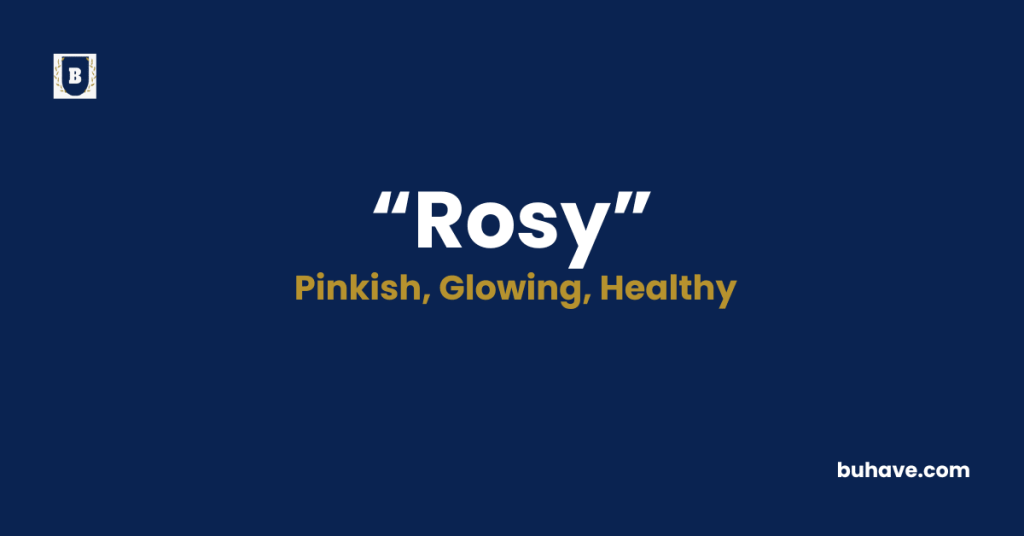The word ‘Rosy’ (Adjective) is often used to describe something that looks bright, hopeful, or cheerful—both literally and figuratively. While it originates from the color of a rose, its meanings go far beyond just describing a tint. In this guide, you’ll discover the full meaning of “rosy,” along with its definition, etymology, real-life usage examples, synonyms, antonyms, and helpful FAQs that show how to use “rosy” naturally in conversation or writing.
Rosy Explained in Depth
A complete and detailed guide to the words Rosy including meaning, definition, examples, etymology, synonyms, and antonyms.
Meanings of Rosy
Rosy is a word that evokes feelings of optimism, warmth, and beauty. Literally, it refers to the pinkish-red color similar to that of a rose. People often describe someone’s cheeks as “rosy” when they are naturally flushed with health or emotion. But beyond appearance, the word takes on symbolic meanings of hope, happiness, and a bright future.
For example, when someone says, The future looks rosy they mean it appears promising or positive. Likewise, if you describe a situation as “rosy,” you’re emphasizing the cheerful or favorable aspects, often in contrast to potential negativity.
It’s a word loaded with emotional connotation. Whether you’re describing a warm smile, a glowing sunset, or an optimistic outlook, rosy captures the soft, pleasant, and hopeful side of life. It’s gentle, encouraging, and often used to uplift moods or describe things in a positive light.
Definition
Rosy describes something that seems bright, hopeful, or full of promise much like the warm, pinkish glow of a healthy face or a beautiful sunrise.
In everyday language, when people use the word rosy, they often mean that something looks very positive or optimistic. For example, if someone says, “The future looks rosy,” they believe good things are likely to happen. It can also describe a soft, pink color, especially in cheeks, flowers, or the sky.
So in short, rosy means pleasant, cheerful, full of hope, or slightly pink in color like the soft glow of a lovely morning.
Etymology
The word “rosy” comes from the Middle English term rosi, which derives from the noun “rose.” The rose flower itself has long been associated with beauty, love, and health—so it’s no surprise that its name was adapted into an adjective that reflects those traits.
Digging deeper, “rose” originates from the Latin word rosa, which passed through Old French rose before arriving in English. By the 14th century, “rosy” was used in English to describe color, especially the natural blush on cheeks. Over time, it evolved to include emotional and symbolic meanings—often tied to joy, warmth, or optimism.
Its evolution mirrors how color often shapes mood and perception in language. Just as the sight of a rose might lift one’s spirits, calling something “rosy” communicates that same emotional glow—whether you’re talking about a person, a dream, or a distant horizon.
Example Sentences
- Her rosy cheeks made her look youthful and full of energy.
- Despite the challenges, he painted a rosy picture of their future together.
- The sky turned a soft rosy hue as the sun began to set.
- The company’s financial outlook is surprisingly rosy given the economic downturn.
- She offered a rosy assessment of the team’s chances at the championship.
Rosy Synonyms
- Hopeful
- Optimistic
- Positive
- Cheerful
- Radiant
- Flush
- Bright
- Encouraging
- Promising
- Blooming
Rosy Antonyms
- Gloomy
- Pale
- Pessimistic
- Bleak
- Hopeless
- Dull
- Sullen
- Discouraging
- Depressing
- Faded
FAQs about Rosy
Here are some frequently asked questions (FAQs) about the word “Rosy”
1. What does “rosy” mean when describing someone’s cheeks?
It means the person’s cheeks have a pink or healthy-looking flush, often due to cold weather, emotion, or overall good health.
2. Can “rosy” describe feelings or emotions?
Yes, absolutely. “Rosy” can describe someone’s outlook, mood, or expectations as bright, cheerful, or optimistic.
3. What are some common phrases that use “rosy”?
Phrases like “a rosy outlook,” “rosy cheeks,” “rosy picture,” and “rosy future” are all popular and convey different shades of brightness or positivity.
4. Is “rosy” formal or informal?
“Rosy” is more informal or poetic in tone. It’s commonly used in conversation, creative writing, and expressive descriptions rather than in technical or formal language.

















